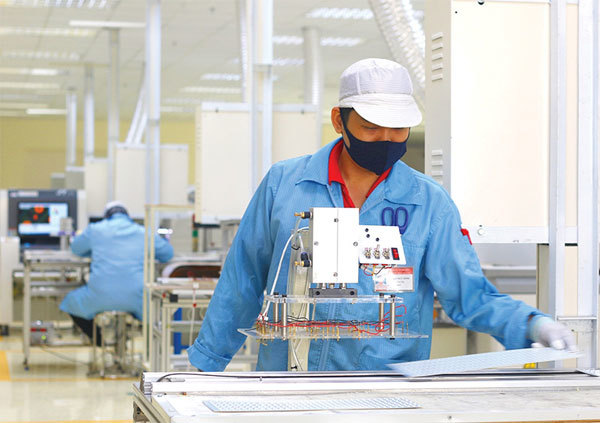despite headwinds negatively impacting on the economy’s growth.
 |
| The 10th session of the 14th NA prioritises post-pandemic recovery. Photo: Le Toan/VIR |
For the first time in many years, the 10th session of the 14th National Assembly (NA), taking place from October 20 to November 17, will hold a two-day Q&A session involving the leaders of the governments and all ministers in a spirit that what they have and will do for the economy must be clarified, as compared to their promises at the legislature’s hall in the previous NA sessions, and what solutions will be jointly advanced to spur on economic growth fuelled by the performance of the business community.
Prime Minister Nguyen Xuan Phuc stated that in the current time of COVID-19, supporting enterprises and investors has been an increasingly urgent matter as many of them have either stopped or suspended operations, meaning that the economy has lost part of its resources for growth.
“Difficulties are still surrounding enterprises and individuals, and we must lift them out of it,” the PM stated at September’s cabinet meeting.
Adam Sitkoff, executive director of the American Chamber of Commerce in Hanoi, told VIR that he highly valued efforts by the government to assist enterprises amid their difficulties. However, the support remains insufficient.
“The economic implications of the pandemic for Vietnam are severe and will affect us for quite some time. Millions of jobs have disappeared, many people have seen their salaries cut, and business activity in most sectors remains slow. As we move towards economic recovery, the financial pressure for many companies will be significant,” Sitkoff said. “AmCham members welcome the announcements of stimulus and support packages applying to a list of industries the government says are greatly impacted such as passenger transport, tourism accommodation, restaurants, and some other fields. However, some business sectors have been overlooked.”
According to a government report sent to NA deputies last week, it is expected that in the whole of 2020, the added value of the industrial sector will increase 2.5 per cent on-year, far lower than the on-year 8.86 per cent rise last year.
“The increasingly complicated pandemic in many nations worldwide has undermined the supply chains of imported materials for the domestic industrial production in the first nine months of the year, especially for the processing and manufacturing sector which creates 80 per cent of the economy’s industrial growth,” said Nguyen Thi Huong, general director of the General Statistics Office.
|
Six laws for adoption at the National Assembly: ● Law on Vietnam’s Border Defence ● Law on Vietnamese People Working abroad under Contract (amended) ● Law on International Agreements ● Law on amendments to the Law on Environmental Protection ● Law on amendments to the Law on Administrative Violation Punishment ● Law on Residence (amended) Six laws for discussion: ● Law on amendments to the Law on Prevention and Control of HIV/AIDS ● Law on amendments to the Law on Road Traffic ● Law on Preventing and Combating Narcotic Drugs ● Law on amendments to the Law on Trade Unions ● Law on Ensuring Road Traffic Order and Safety ● Law on Forces to Protect Order and Security in Localities |
Varying difficulties
A representative from US-backed Cargill Vietnam told VIR that despite operating in Vietnam for 25 years, Cargill still finds it challenging when it comes to policies.
“For example, like other agri-businesses, Cargill is facing some difficulties in policy implementation. Legal changes are not keeping up with market changes. Vietnamese agriculture has been growing very fast in the past few years, and as a result, some issues which have not yet been addressed in any current legal documentation are arising across production and business activities, causing problems for enterprises,” the representative said.
According to the representative, the discrepancies in implementation of policies and coordination among some state bodies are confusing businesses. Moreover, some regulations have a rushing execution roadmap that makes it hard for businesses to adapt their operations to the changes. This creates difficulties for well-complying businesses while creating a loophole for non-conforming ones. This is to some extent going against the government’s policy of creating a transparent, fair, and healthily competitive investment environment.
“We wish that the NA will help enterprises remove these difficulties,” he stressed.
At the NA’s Standing Committee meeting held a few weeks ago, NA Chairwoman Nguyen Thi Kim Ngan stated that despite businesses’ health in general is significantly improving, into next year the economy is expected to face numerous obstacles caused by COVID-19, global uncertainties, protectionism, and trade conflicts.
“This will surely continue to have negative impacts on Vietnam’s production and exports, especially when many local enterprises remain in the mire and economic growth remains not quite sustainable,” she said. “Thus, at the coming NA session, more specific solutions to assist enterprises and cope with external issues must be made.”
With negative impacts of COVID-19, the government has set a target of 2.5-3 per cent in economic growth this year, making Vietnam the nation with the highest growth in Southeast Asia.
It is expected that in 2020, the GDP scale will be VND6.3 quadrillion ($273.9 billion), up by about VND263 trillion ($11.43 billion) as compared to 2019, and lower than the on-year VND500 trillion ($21.74 billion) increase recorded last year.
In need of support
This year, the survey results of the European Chamber of Commerce in Vietnam’s (EuroCham) Business Climate Index reduced to the lowest level, at 26 per cent, due to COVID-19.
“More than half of CEOs surveyed believed that Vietnam’s macroeconomy stabilised and improved from May to July, and 49 per cent of businesses’ leaders predicted that they will resume close to normal operations in the time to come,” EuroCham said in a statement. “Among necessary support measures, we see that tax reduction remains the most required by EU businesses from the government. It is clear that leaders of EU businesses see that they are operating in a difficult period.”
Meanwhile, the Japanese Chamber of Commerce and Industry in Vietnam stated that one of the biggest challenges for Japanese enterprises in Vietnam is that they want the country to become more digitalised so that they can operate more effectively here.
“Previously, digitalisation and digital transformation were paid attention to. But now, such attention has become of higher importance due to negative impacts of the coronavirus. The Vietnamese government has set out a national programme on digital transformation until 2025, with a vision to 2030. Japanese businesses are also seeking opportunities to invest into Vietnam in the digital industry,” JCCI said in a statement.
Meanwhile, Christopher Jeffery, chairman of the British Chamber of Commerce in Vietnam, said that what they need the most now is a plan from the Vietnamese government to allow British experts and business leaders to enter the country to work and continue their projects.
“Many enterprises are facing numerous barriers in operation as their key staff cannot directly work at the enterprises. Many families, especially those with kids, are also facing lots of difficulties as many of their members cannot return to them,” Jeffery said. “To come back to Vietnam, they must wait within 3-4 months to be allowed to enter the country, and so we propose that the government support us in solving this issue.”
According to the NA’s Office, recommendations will be discussed at the legislature from this week.
Seeking solutions
“These issues must get due attention and must be carefully discussed at the NA’s upcoming session. The government needs to increase inspections at ministries and localities in order to ensure the effectiveness of the government’s efforts to reduce and remove unnecessary business conditions, and boost administrative procedures,” said Vu Hong Thanh, Chairman of the NA’s Economic Committee.
He also stressed, “I think that one of the best solutions to support enterprises is to quickly and truly remove unnecessary administrative procedures in all business sectors, especially investment, construction, transport, and education.”
“All processes and procedures must be truly made transparently and openly, with all violators be strictly punished in order to eradicate unofficial costs for people and enterprises,” he continued.
As for Sitkoff from AmCham Hanoi, he also pointed out that AmCham members remain concerned with changes in policy and regulations that are not consistent with international best practices. These changes expose many investors to considerable risks in executing their investments.
“AmCham continues to encourage continuous improvements in infrastructure development, protection of intellectual property, education reform, legal and tax policy certainty, and enhanced transparency in Vietnam. Progress in these areas will not only help attract more foreign investment, but will also support Vietnam’s aspirations to propel itself to the next sphere of economic competitiveness,” Sitkoff said. VIR
Thanh Thu

Gov't direct debt nears allowable ceiling: NA
The Government’s direct debt payment obligations may reach the permissible ceiling of 25% of the 2020 State budget collections and are expected to stand at over 25% of the State budget collections in 2021,

Businesses line up for further support
Continued facing with massive woes, the business community in Vietnam is in dire need of the government’s assistance for investors and enterprises to struggle through the global health crisis and grabbing new business